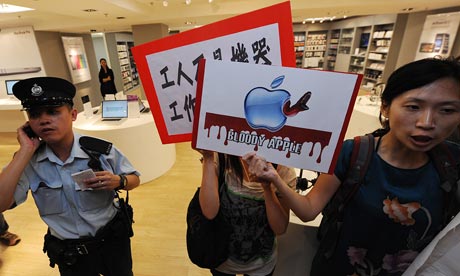$1,000 for a laptop and minimal software, $400 for a top-shelf smart phone and a fully functional data package, $500 for an iPad or other tablet, $600 for an adequate TV to stay current with news and popular media, and $500 for miscellaneous spending (Cable services, subsrciptions, apps, kindles, etc.). That doesn’t seem that bad does it?
What if the price of digital maximilism is a life-- not an American life but rather a life of a Chinese worker in a factory abroad. A Chinese worker who acquired an outsourced factory job from and American-based manufacturer, for his/her work is cheaper and he/she is less likely to complain about.
We in society have become so consumed with staying connected that we have become ignorant and oblivious to the expenses. The expense is far greater than missing out on a piece of daily solitude or respite that provides a peace of mind.
We have been spoon fed the idea that “digital connectedness is [so] intrinsically good” that we blindly and irrationally act, as children do, to get the newest fastest, and most capable “toy” available. We are not being more connected with this purchases, however. Instead, we are feeding into the iconoclastic view that fueling capitalistic greed and emotional desire is more valuable to our lives than being at peace or creating a face-to-face verbal relationship. We are becoming spoiled children.
This gluttony to purge our hunger for new technology and new mediums to facilitate a superficial connection is now disguised under the cloak of digital maximalism. According to Powers, “Digital maximalism is clearly a superior way of living.” Is this superioririty worth the unconscious subjectification of others to a state of inferiority?
On January 25, 2012, New York times released a story title, “Human Costs are Built into Apple‘s iPad.” The story explains how two recent explosions in Apple factories abroad killed 4 workers and injured 77 others (some critically). These explosions weren’t unforeseen. Prior to the blasts, a Chinese group titled Students and Scholars against Corporate Misbehavior published an article chronicling the hazardous conditions inside of the plant with the larger, more deadly explosion, Chengdu.

Apple’s capitalistic greed caused it to ignore the conditions in order to produce more and more goods for the consumers. The consumers’ self-aggregated and society influenced “need” to stay current fuels the manufacturers need to carryout swift and unsafe productions, for the manufacturer (in this case Apple) has to keep up with demand it wants to keep business. It is a vicious cycle.
This recursive process, created by the digital maximalistic lifestyle has monstrous implications on more than the producer and consumer of these goods. It is negatively affecting innocent and hard working Chinese Americans, it is taking away father’s from families, children from their parents, and wives from husbands. Is all this truly worth staying connected? If your answer is yes, you are no longer a person using digital maximalism to your advantage. You have become a slave to the ensuing digital revolution.


No comments:
Post a Comment